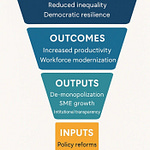As at March 2025, Malaysia's Employees Provident Fund’s total investment assets stood at RM1.26 trillion, with 62% from domestic investments and 38% invested overseas. International investments contributed RM8 billion, or 44% of total income for the quarter.
However, EPF posts RM18.31b investment income in 1Q2025, down 13%.
If EPF continues to act as a low-risk, domestically-constrained savings pool, it will increasingly fail to deliver real returns in a fragmented and inflation-prone global economy.
It must evolve into a national sovereign investment powerhouse—balancing commercial returns, national priorities, and member trust.
To accelerate its investment income and enhance long-term returns for contributors and the national economy, Malaysia’s Employees Provident Fund (EPF) must adopt a strategic, diversified, and future-proofed investment approach, grounded in national interests and global economic realities.
A breakdown of what EPF needs to do: a 2-minute video-presentation HERE as undertaken by STORM'S Collective on Geoeconomics, together with the stormcloud production team.










